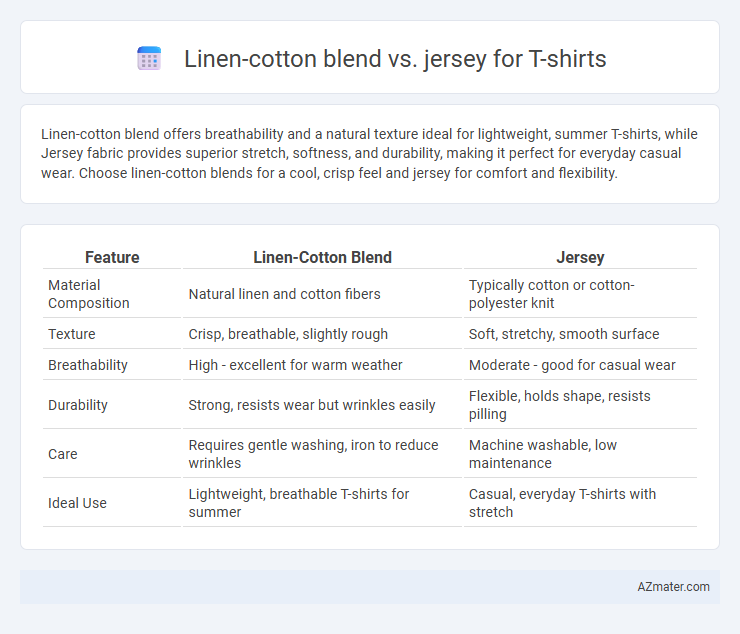Linen-cotton blend offers breathability and a natural texture ideal for lightweight, summer T-shirts, while Jersey fabric provides superior stretch, softness, and durability, making it perfect for everyday casual wear. Choose linen-cotton blends for a cool, crisp feel and jersey for comfort and flexibility.
Table of Comparison
| Feature | Linen-Cotton Blend | Jersey |
|---|---|---|
| Material Composition | Natural linen and cotton fibers | Typically cotton or cotton-polyester knit |
| Texture | Crisp, breathable, slightly rough | Soft, stretchy, smooth surface |
| Breathability | High - excellent for warm weather | Moderate - good for casual wear |
| Durability | Strong, resists wear but wrinkles easily | Flexible, holds shape, resists pilling |
| Care | Requires gentle washing, iron to reduce wrinkles | Machine washable, low maintenance |
| Ideal Use | Lightweight, breathable T-shirts for summer | Casual, everyday T-shirts with stretch |
Introduction to Linen-Cotton Blend and Jersey Fabrics
Linen-cotton blend fabrics combine the natural breathability and durability of linen with the softness and flexibility of cotton, making them ideal for lightweight and comfortable T-shirts. Jersey fabric, typically made from cotton or cotton blends, is known for its stretchability, smooth texture, and excellent moisture-wicking properties, offering a snug yet breathable fit. Both fabrics cater to casual wear, but linen-cotton blends excel in texture and cooling effects, while jersey fabrics prioritize stretch and softness.
Fabric Composition and Texture
A linen-cotton blend T-shirt combines the natural breathability and durability of linen with the softness and elasticity of cotton, resulting in a lightweight fabric with a slightly textured, crisp feel. Jersey fabric, typically made from 100% cotton or a cotton blend, offers a smooth, stretchy surface with a soft hand, ideal for casual wear and enhanced comfort. The linen-cotton blend excels in moisture-wicking and ventilation, whereas jersey prioritizes softness and flexibility, making fabric composition and tactile texture key factors in choosing between the two.
Breathability and Comfort Comparison
Linen-cotton blends offer superior breathability due to the flax fibers in linen, enhancing moisture-wicking and airflow, making them ideal for hot weather. Jersey fabric, primarily made from cotton, provides a softer, stretchier feel with moderate breathability, suitable for casual wear and active use. While linen-cotton blends excel in ventilation and cooling, jersey T-shirts deliver comfort through flexibility and softness, balancing breathability with ease of movement.
Durability and Longevity
Linen-cotton blend T-shirts offer superior durability due to the strength of linen fibers combined with the softness of cotton, resulting in long-lasting wear and resistance to pilling and shrinkage. Jersey fabric, typically made from cotton or cotton blends, provides excellent stretch and comfort but tends to be less durable over time because of its knit construction, which can lead to faster fabric wear and loss of shape. For longevity, linen-cotton blends maintain structural integrity and crispness through multiple washes, making them ideal for durable, long-lasting T-shirts.
Moisture-Wicking Abilities
Linen-cotton blend fabrics exhibit excellent moisture-wicking properties due to linen's natural breathability combined with cotton's absorbency, making them ideal for keeping skin dry and cool in warm weather. Jersey fabric, typically made from cotton or cotton blends, offers moderate moisture-wicking but tends to retain more moisture compared to linen-cotton blends, which can affect overall comfort during intense physical activity. Choosing a linen-cotton blend T-shirt enhances moisture management and breathability, optimizing comfort for hot and humid conditions.
Weight and Drape Differences
Linen-cotton blend T-shirts typically weigh more due to their natural fiber density, providing a slightly heavier and textured feel compared to jersey fabric, which is lighter and smoother. The linen-cotton blend offers a structured drape that holds shape well, creating a crisp and breathable fit, while jersey fabric drapes softly and conforms closely to the body for enhanced comfort and flexibility. Weight differences range from around 150-230 gsm for linen-cotton blends versus 120-180 gsm for jersey, impacting how each fabric moves and sits on the wearer.
Style and Visual Appeal
Linen-cotton blend T-shirts offer a textured, slightly rustic appearance with natural breathability and a matte finish that enhances casual, relaxed styles. Jersey fabric provides a smooth, soft surface with excellent stretch, resulting in a sleek, form-fitting silhouette that complements modern and sporty looks. The choice between the two influences both the drape and the overall aesthetic, with linen-cotton presenting a more artisanal vibe, while jersey emphasizes comfort and contemporary style.
Care and Maintenance Requirements
Linen-cotton blend T-shirts require gentle washing in cold water to prevent shrinkage and maintain fabric integrity, with air drying recommended to avoid heat damage. Jersey T-shirts, made primarily from cotton or cotton blends, are more durable and machine washable, but benefit from washing inside out to minimize pilling and preserve color vibrancy. Both fabrics should avoid bleach and high-heat ironing, though linen-cotton blends may need more frequent touch-ups for a wrinkle-free appearance.
Cost and Value Analysis
Linen-cotton blend T-shirts typically cost more due to the premium quality and breathability of linen fibers combined with the softness of cotton, offering enhanced durability and comfort. Jersey fabric T-shirts are generally more affordable, providing good stretch and softness but potentially lower longevity compared to linen-cotton blends. The higher price of linen-cotton blend T-shirts corresponds to better moisture-wicking properties and a cooler wear experience, delivering greater long-term value despite the initial investment.
Best Uses and Recommendations
Linen-cotton blend fabrics offer breathability and durability, making them ideal for casual summer T-shirts and outdoor activities where moisture-wicking and temperature regulation are priorities. Jersey fabric provides exceptional stretch and softness, perfect for everyday wear and activewear T-shirts requiring flexibility and comfort. For a balance of texture and comfort, choose linen-cotton blends in warm climates, while jersey is recommended for versatile, all-season wardrobe staples.

Infographic: Linen-cotton blend vs Jersey for T-shirt
 azmater.com
azmater.com